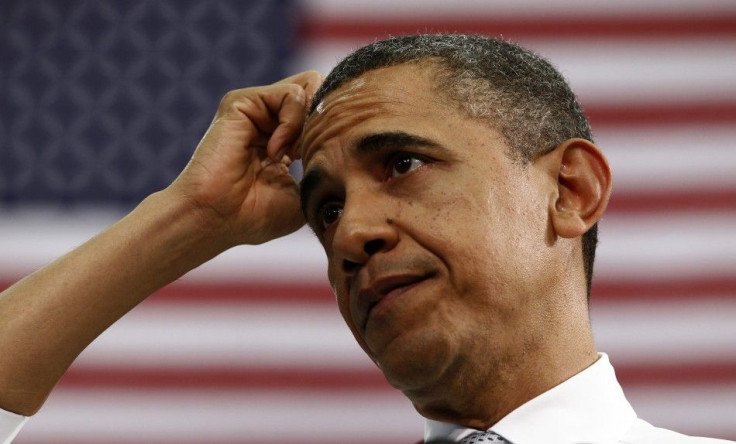Will Latest State Jobs Figures Threaten Obama's Re-Election Prospects?

As U.S. President Barack Obama shifts the focus of his re-election campaign from joblessness to income inequality, unemployment has increased in more than one-half the country's states this year. The latest state-by-state figures could be a blow to the incumbent Obama, economists and political analysts say.
All told, 27 states registered increases in unemployment, the U.S. Bureau of Labor Statistics reported on Friday. Jobless levels were flat in 12 states. And 11 states, as well as the District of Columbia recorded decreases in unemployment -- the fewest since last August.
Colorado, Indiana, Nevada, New Mexico, and Wisconsin all shed jobs in the past month, the Bureau of Labor Statistics reported. Wisconsin was the biggest loser, as it dropped 13,000 jobs during this period,
Elsewhere, Massachusetts held more or less steady with an unemployment rate of 6 percent, although it did shed 2,600 jobs.
Meanwhile, growth was feeble in Florida, where the president was an ardent campaigner this week. The battleground state had an unemployment rate of 8.6 percent -- a decline of 2.1 percentage points from the rate in the year-ago period -- but it added only 9,000 jobs in June.
Although 29 states added jobs last month, compared with 27 in May, the national jobless rate remains high at 8.2 percent as the country enters its third straight month of weak employment growth, with the creation of only 80,000 jobs last month.
Obama and Republican contender Mitt Romney waged a war of words on the heels of the release of the latest monthly employment figures a couple of weeks ago, with Romney calling them a kick in the gut during a campaign press conference in Wolfeboro, N.H., and Obama contending they constituted a step in the right direction during a campaign speech in Poland, Ohio.
Millions and millions of families are struggling because the president's policies haven't worked, Romney said during his press conference. The president's policies have clearly not been successful in reigniting this economy, in putting people back to work and in opening factories across this country.
As long as national unemployment stays in the range of 7-8 percent, it will have a negative impact on presidential election prospects, said Jagadeesh Gokhale, a senior fellow and economist at the Cato Institute, a libertarian think tank based in Washington. The latest state unemployment figures are an indication that he [Obama] hasn't been a good steward for the economy, he added. The key point is what he has done during the last four years. His politics haven't worked.
Obama has called attention to the private sector's creation of 4.4 million jobs during the past 28 months. But economists said the creation of jobs at this pace will do little to better unemployment levels, which will not markedly improve unless and until more people who have dropped out of the labor force get back into the job hunt -- and eventually become successful in their search for work.
Federal Reserve Chairman Ben S. Bernanke's overt pessimism about the economy during his testimony before both houses of Congress this week is likely to further discourage people from looking for work, economists said.
Some political analysts said voters would be more receptive to news about the national economy as a whole, rather than the temperaments of individual states. Others said that job loss in any form is a bad omen for economic recovery.
That the number of jobless Americans has increased in more than one-half the country's states does not bode well for economic growth as employment and income generation are key drivers of domestic consumer spending, which makes up about 70 percent of U.S. gross domestic product.
Personal consumer expenditures are most strongly correlated with job growth, said Sharon Stark, chief market strategist at Sterne Agee, a brokerage and investment firm headquartered in Birmingham, Ala. Long-term unemployment continues to be high, and average hourly earnings are stagnant.
Weak exports and pessimistic consumer sentiment have adversely affected business demand, discouraging employers from expanding their hiring plans.
Meanwhile, the looming fiscal cliff may be dampening domestic consumer demand as Americans feel increasingly uncertain about the government's precarious fiscal policy and its apparent ineffectiveness in striking a budget deal to mitigate the effects of tax increases and spending cuts, following the exhaustion of the Bush tax cuts on Dec. 31.
All these factors are weighing on the economy and on the minds of employers, Gokhale said.
The average of opinion polls reported by RealClearPolitics currently show Obama leading Romney by 4.8 points in Wisconsin, the state with one of the largest job declines this year. The equivalent margins are 2.9 points in Colorado, 1.2 points in Virginia, and 0.4 points in Florida.
Moves in the jobless rates in these and other states appear likely to have significant effects on the moves in such margins between now and the November general election.
© Copyright IBTimes 2024. All rights reserved.





















